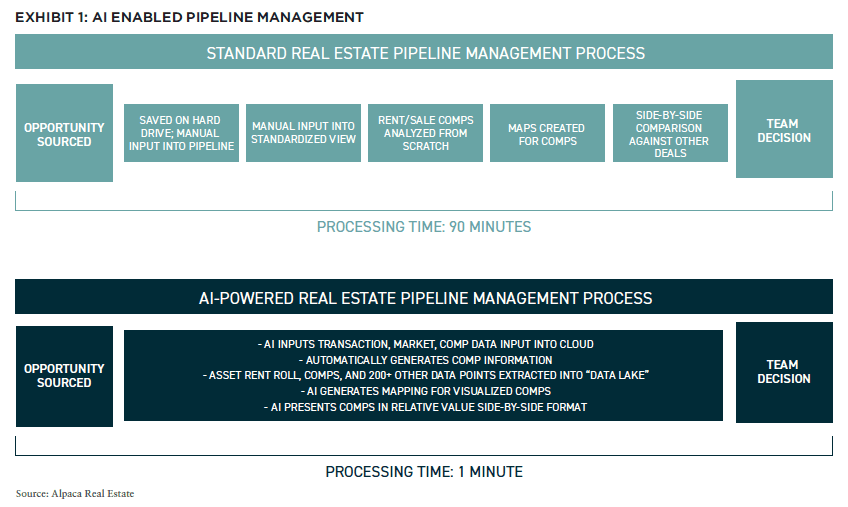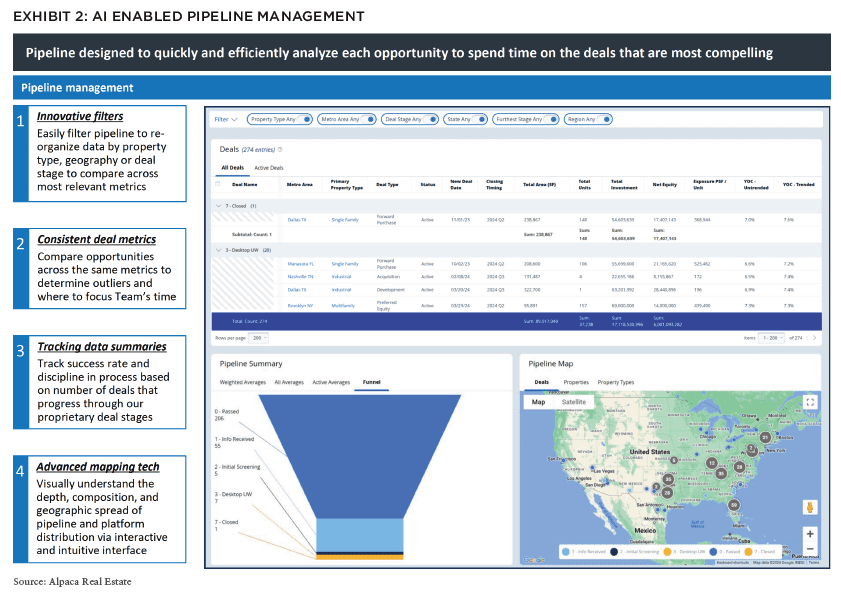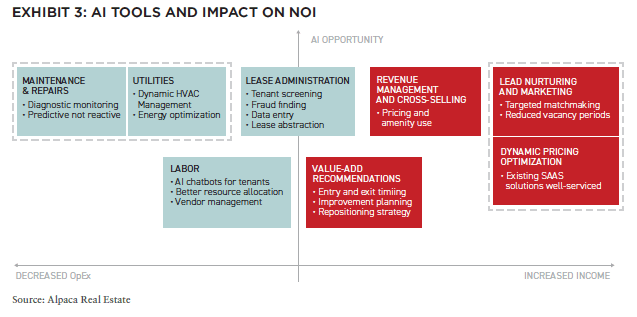AI’s impact in real estate can be traced along two distinct verticals: In-Asset, where platforms enhance value through property performance, and Out-of-Asset, where platforms transform the workflows of the deal ecosystem.
Even as artificial intelligence (AI) has rapidly emerged as a transformative technology across various sectors, the impact of AI in commercial real estate is still nascent.
Broadly, these impacts can be traced along two distinct verticals: In-Asset, where platforms are intended to enhance value primarily by improving property performance, and Out-of-Asset, where platforms enhance real estate deal ecosystem workflows, particularly within the investment and asset management teams.
It is important to note that these technologies are still early and have yet to become market norms. New platforms are being introduced every month, some with competing or contradicting value propositions. However, as quickly as these tools are being rolled out, they are also beginning to prove their value.
Early adopters across either vertical can position themselves at a competitive advantage, which can lead to outsized returns for investors. This article will discuss some of the more promising tools that are already beginning to return value and discuss what the industry can look forward to as the sector continues to mature.
AI OVERVIEW
AI has been operating in the background of different operating systems for years, but the emergence of consumer-friendly AI tools, such as ChatGPT, has created an inflection point that has accelerated public familiarity with AI, prompting exploration and creativity around alternative AI use cases.
One of the logical applications of AI is integration into established business models with repeatable, often tedious tasks that rely on large datasets. Traditional, rule-based software operates based on predefined instructions and is best suited for static, repeatable tasks. On the other hand, AI is able to simulate human-like reasoning to adapt and make context-aware decisions. Within real estate, where robust data has been captured for decades, AI capabilities are finally able to transform this disparate information into actionable insights.
AI IN INVESTMENT MANAGEMENT

Investment managers frequently encounter the problem of managing an overwhelming amount of information without an effective method of synthesis. For example, McKinsey reported in 2018 that nearly 60% of predictive power in real estate comes from non-traditional variables.1
Furthermore, organizations without centralized information storage impair their own institutional knowledge, as data is fragmented across different folder systems. AI presents various options to synthesize data and render it readily usable. Among the most promising applications are the following:
- Deal Pipeline Management: AI can prioritize and filter deal opportunities based on predefined criteria, ensuring that deal teams focus on the most promising prospects. This capability can enhance the efficiency of the deal sourcing process and helps identify high-quality investment opportunities more quickly.
- Relative Value Analysis: AI-powered platforms can easily sort, organize and analyze the vast amount of information in the “data lake” so that deals can be compared on a relative value basis with the click of a button. Understanding relative value allows the deal team to make quick, informed decisions on which deals to advance to a detailed underwriting stage.
- Automated Reporting: AI-powered reporting tools can automatically generate detailed performance reports, consolidating data from various sources. This automation reduces the time and effort required for report preparation, allowing deal teams to focus on strategic analysis and decision-making.
- Performance Monitoring: AI tools can track and analyze key performance indicators (KPIs) across different assets. This centralized database creates efficiencies in reviewing portfolio wide metrics and allows for more regular and consistent asset reviews.
- Negotiation Efficiencies: AI can streamline the negotiation process by providing transparent scoring for commercial loan applications and other financial assessments. This transparency facilitates quicker decision-making and enhances efficiency.
One pipeline management solution is to create bespoke platforms powered by AI to manage investment opportunities and create institutional knowledge. Exhibit 2 shows example of this method in the pipeline management framework.
The graphic shows how our firm, Alpaca Real Estate (Alpaca), evaluated dozens of technology applications and worked closely with Alpaca VC to select the right partners to build a bespoke solution. The output is a thoughtfully customized platform that best fits Alpaca’s investment approach and process.
At the institutional level, real estate is already an inherently human capital-efficient industry, with lean deal teams. As a result, rather than building a platform that focuses exclusively on cost or time savings, we’ve found it more useful to ask: What information do we use to make us better investors, and where can automated data aggregation help us in those decisions?

As an example, Alpaca utilizes a macro-driven thematic investment process to identify two to four sectors of interest. We then focus only on those sectors and markets to generate deep focused deal flow. Therefore, the informationwe use to make decisions lies in relative value; which property, in the market and sector we like, has the best basis, positioning, and opportunity to outperform? Which transaction has structural alpha to set it apart from the rest?
Typically, pipeline data aggregation falls to the deal team. With mandates that are often time-sensitive, deal teams tend to deprioritize data input, resulting in unstable datasets that lacks insights. Instead of hiring additional deal team staff to input data, Alpaca Real Estate worked extensively with Alpaca VC to identify processes and partners that enable creation of a clean data lake that can be easily queried by the deal team, thus enhancing their workflow. The human capital savings is roughly –two or three analyst-level employees who would otherwise be solely dedicated to inputting –up to a hundred transactions per month.
This system automates data collection from various sources, cleaning, and organizing into a standardized data lake, which has traditionally been a time-consuming task. Prior to this, in our experience, analysts would spend up to 1.5 hours manually inputting deal information into a static data pool and preparing analytic visualizations. Bespoke AI platforms can eliminate this manual task and automatically scrape more than two hundred data points per transaction, from offering memorandums and financial documents. Visualizing this data through consistent metrics and mapping in a clean interface streamlines the pipeline process, allowing for greatly improved efficiency in initial deal evaluation and data retrieval. The automated process integrates a greater number of deals into the data lake which allows the deal team to reallocate their time to analyzing trends from the amplified base of institutional knowledge. The deal team can use this foundation to understand the relative value of new opportunities with the click of a button.
As an example of this platform in action, Alpaca identified townhome rental product in Dallas, Texas as one area of interest using macro thematic research. The deal team then sourced approximately 35 townhome investment opportunities in the market, all of which were uploaded to the screening software. One opportunity was a clear outlier: a 7% yield on cost in a highly infill location boasting household income two times the metro average and walkable to a fantastic elementary school. When queried, the average yield in the comp set was 6.25%, indicating a 75BPS yield premium for the subject transaction. Alpaca keyed in on these details and ultimately closed the investment due to the clear relative value opportunity.
PROPERTY SECTOR SPECIFIC IMPLEMENTATION

In-Asset AI tools are platforms designed to enhance property performance. Ideally, the impact of these platforms can be quantitatively measured by optimizing net operating income (NOI) through various means, such as dynamic pricing, predictive maintenance, and energy management. These solutions aim to increase revenue, reduce operating expenses, and improve asset value. Potential AI implementation is more obvious within operating intensive assets but has applications within less intensive assets as well.
AI’s versatility allows it to be applied across various stages of the real estate value chain. Key applications on the In-Asset side include:
- Customized Marketing: AI can access vast datasets to qualify prospective tenants or market specific property attributes that may appeal to an individual. This customized marketing can impact conversion ratios in hospitality and multifamily.
- Surveillance: AI enhances security by analyzing surveillance footage in real-time, identifying unusual activities, and alerting security personnel. This capability is particularly valuable in high-traffic areas or properties with complex security needs.
- Energy Management: AI-powered energy management systems can monitor and control building systems, optimizing energy use and reducing costs. These systems can also integrate with renewable energy sources, such as solar panels, to further enhance sustainability.
- Predictive Maintenance: AI can predict equipment failures by analyzing data from sensors and other sources. This proactive maintenance approach minimizes downtime and reduces the cost of repairs, enhancing overall operational efficiency.
- Tenant Communication: AI chatbots and virtual assistants can handle routine tenant inquiries, provide information about lease terms, and even assist with maintenance requests.
The versatility of AI makes it applicable across a wide range of property types, each with its own unique challenges and opportunities. As AI technologies continue to evolve, their applications in real estate will expand, offering new opportunities for efficiency gains, cost savings, and improved management practices. Importantly, the more landlord control over the asset, the more levers there will be for tech adoption to improve asset performance. “Operating businesses” such as hospitality, multifamily, and single-family rental fall into this category. Net lease businesses on the other hand, such as office or industrial, have thus far seen relatively fewer platforms emerge. Below, we highlight a few examples per category with this distinction in mind.
EXAMPLES OF AI COMPANIES IN USE ACROSS SECTORS
HOSPITALITY
As an operating-intensive asset class, the hospitality sector has embraced AI more than other asset class and still has the most potential to create efficiencies through AI adoption.2,3 The high-touch and repetitive nature of hospitality creates opportunities for AI in areas like revenue management, guest services, and operational efficiency.
AI Use Case: Revenue management
Duetto is an example of an AI-powered revenue management system that uses real-time data to optimize room pricing based on factors like demand, competition, and market conditions. This dynamic pricing approach has been shown to increase revenue per available room (RevPAR) and overall profitability.4 Our case studies with Duetto and other AI revenue management platforms exhibited up to a 20% RevPAR uplift.
AI Use Case: Guest experience
Revinate elevates the guest experience through chatbots and virtual assistants that can handle routine inquiries, provide personalized recommendations, and streamline the check-in and check-out processes. While the ROI on an improved guest experience is difficult to precisely measure, it is an important factor in product differentiation. The increased guest interaction improves the guest experience without additional strain for the existing staff.
NEW: SUMMIT #16

NOTE FROM THE EDITOR: ISSUE #16
Benjamin van Loon, CAE | AFIRE
GLOBAL CONSUMPTION: APAC DATA CENTER INVESTMENT STRATEGIES IN THE AGE OF DIGITIZATION
Michelle Lee, Eugene Seo, and Wayne Teo | CapitaLand Investment
DISTINCT VERTICALS: AI IS CHANGING THE REAL ESTATE INDUSTRY ON TWO DISTINCT PATHS
Daniel Carr and Andrew Peng | Alpaca Real Estate
DIVERGING FORTUNES: ARE COMPARISONS BETWEEN OFFICE AND RETAIL STILL WARRANTED?
Brian Biggs, CFA and Ashton Sein | Grosvenor
OCCUPYING FORCE: INSTITUTIONAL OFFICE PROPERTIES FEELING THE PAIN
Nolan Eyre, Scot Bommarito, and William Maher | RCLCO Fund Advisors
VALUE-ADD VS. CORE: COMPARING CORE AND NON-CORE STRATEGIES WITH NEW DATA
Yizhuo (Wilson) Ding | Related Midwest and Jacques Gordon, PhD | MIT Center for Real Estate
FAVORABLE CONDITIONS: STRUCTURAL CHANGES TO THE MARKET FAVOR NONBANK CRE LENDERS
Mark Fitzgerald, CFA, CAIA, and Jeff Fastov | Affinius Capital
INFRASTRUCTURE VIEWPOINT: INTEREST RATE CHANGES COULD UNLOCK NEW INFRASTRUCTURE INVESTMENTS
Tania Tsoneva | CBRE Investment Management
MISSING MIDDLE: WORKFORCE AND AFFORDABLE HOUSING IN THE US
Jack Robinson, PhD and Morgan Zollinger | Bridge Investment Group
NARROW SPACES: CHOKED STRAITS AND IMPLICATIONS FOR GDP, INFLATION, AND CRE
Stewart Rubin and Dakota Firenze | New York Life Real Estate Investors
OPCO-PROPCO OPPORTUNITY: EMERGING MODELS AND THE KEYS TO STRUCTURING PARTNERSHIPS
Paul Stanton | PTB and Donal Warde | TF Cornerstone
TRANSFORMING LUXURY: UNLOCKING VALUE IN LUXURY HOSPITALITY REAL ESTATE
Alia Peragallo | Beach Enclave and AFIRE Mentorship Fellow, 2024
SOLAR VALUATION: IS SOLAR ENERGY A VALUATION GAME-CHANGER?
David Wei and Michael Conway | SolarKal
GROUND LEVEL: THE CASE FOR GROUND LEASES AND LONG-TERM CAPITAL
Shaun Libou | Raymond James
LEGAL UPDATE / DRIVING FORCE: UNDERSTANDING SYNDICATED LOANS AND MULTI-TIERED FINANCING
Gary A. Goodman, Gregory Fennell, and Jon E. Linder | Dentons
LEGAL UPDATE / ENHANCED PROTECTION: LEVERAGING THE SAFETY ACT FOR ENHANCED LIABILITY PROTECTION IN REAL ESTATE
Andrew J. Weiner, Brian E. Finch, Aimee P. Ghosh, Samantha Sharma, and Sarah Hartman | Pillsbury
+ EDITOR’S NOTE
+ ALL ARTICLES
+ PAST ISSUES
+ LEADERSHIP
+ POLICIES
+ GUIDELINES
+ MEDIA KIT
+ CONTACT

MULTIFAMILY
The multifamily sector has similar elements of operating intensity that present opportunities for AI adoption to drive efficiencies. AI applications range from leasing and tenant management to maintenance and security.
With the many services required to effectively operate a multifamily platform, there is a risk of service redundancy and the integration of AI solutions with existing property management systems.
AI Use Case: Downtime to lease vacancies
Reffie leverages AI to prioritize and automate lead generation and follow-up, potentially reducing the time it takes to fill vacancies.
The application focuses on the prioritization and categorization of leads. The model collects metadata on prospects to prioritize leads in the funnel, paired with an automation platform that allows leasing agents to design playbooks of how they handle leads. This not only improves occupancy rates but also enhances the overall tenant experience by providing timely and personalized communication (halving average availability from 27 to 14 days, per company data).
AI Use Case: Predictive maintenance
Dwellwell is using AI-driven sensor technology to create more efficient maintenance systems. This technology can predict equipment failures and schedule preventive maintenance, which reduces downtime and repair costs. This proactive approach to maintenance not only saves money but also extends the lifespan of equipment.
DATA CENTER
Data centers are critical infrastructure for the digital economy, and their role has become more pertinent with the increased demand for AI. This spike has led to increased energy consumption and operational complexity that requires real-time optimization of energy management and cooling systems.
AI Use Case: Energy optimization
Phaidra’s AI systems continuously learn and adapt to the operational dynamics of a central utility plant, leading to significant improvements in energy efficiency. By optimizing the use of equipment like chillers, boilers, and pumps, Phaidra can reduce energy consumption and lower operational costs.
OFFICE
The office sector is experiencing significant changes, driven by evolving work patterns and the increasing demand for flexible workspaces. AI tools can help optimize office space utilization, manage leases, and improve tenant satisfaction.
As the office sector adapts to new work models, such as remote and hybrid work, AI will play a crucial role in helping property managers and tenants navigate these changes. The ability to quickly adjust office layouts and policies in response to changing needs will be essential for maintaining tenant satisfaction and competitiveness.
AI Use Case: Office occupancy insights
VergeSense provides tenants with comprehensive occupancy insights to determine the most efficient use of space, identify underutilized areas, and suggest reconfigurations to better meet tenant needs. This space use visualization can help landlords in difficult tenant downsizing discussions by clearly articulating utilization.
AI Use Case: Lease abstraction and facility management
FYXT uses AI to digitize complex net leases, creating a streamlined workflow for commercial property operations. As a result, maintenance tracking, tenant communication, and facility management such as vendor payments can flow automatically from one platform.
INDUSTRIAL
As a less operating intensive business, industrial assets still benefit from AI applications relevant to business operations. AI enhances process automation, predictive maintenance, and operational efficiency which are often central to industrial and manufacturing businesses.
AI Use Case: Logistics management
Envio has created proprietary hardware, software and location technology to improve logistical management. AI solutions for tracking and shipping packages assists in inventory management at industrial properties.
AI Use Case: Cold storage management
Sonicu utilizes an AI-based monitoring system that eliminates manual logging and improves compliance readiness. For spec cold storage in particular, flexibility of temperature zones is important as each tenant can have different specs. AI can monitor and adjust temperature settings in real-time, ensuring that products are stored at the optimal temperature and reducing energy consumption.
CHALLENGES AND CONSIDERATIONS
The power of AI to inform our decision—both at the property and asset management level—is undeniable. However, with the technology in its infancy, many firms are faced with questions around what tools to utilize, how to invest in the space, and what will impact their bottom line.
We advise firms to start with the end in mind. Create near-term, achievable goals that can have clear KPIs and a monitored budget. Avoid cumbersome, historical datasets and attempts to create all-encompassing solutions. Instead, focus on incremental wins that will lead to firmwide adoption and tangible ROI. Allocate human personnel with clearly defined projects, which they can in turn translate into succinct contract scope of work language with third party vendors.
As with any new technology there is no harm in sample testing. Query a vendor by utilizing a subset of an existing portfolio – get to know the output format, and how that can be translated by property or asset management staff into actionable decisions. AI has the potential to revolutionize the real estate industry by offering powerful tools for investment management, property management, and sector-specific applications. AI’s ability to analyze vast datasets, automate complex processes, and provide predictive insights makes it an invaluable asset for real estate professionals. While challenges such as data privacy, accuracy, and implementation costs remain, the potential benefits of AI in enhancing efficiency, reducing costs, and improving decision-making are significant. As AI continues to advance, its impact on the real estate sector will only grow, creating new opportunities and challenges for industry stakeholders.
—
NOTES
1. “Getting Ahead of the Market: How Big Data is Transforming Real Estate,” McKinsey & Company, October 2018, https://www.mckinsey.com/~/media/McKinsey/Industries/Capital%20Projects%20and%20Infrastructure/Our%20Insights/Getting%20ahead%20of%20the%20market%20How%20big%20data%20is%20transforming%20real%20estate/Getting-ahead-of-the-market-How-big-data-is-transforming-real-estate.pdf
2. “AI’s Transformative Role in the Hospitality Industry,” Deloitte, February 13, 2024. https://www.deloitte.com/uk/en/Industries/consumer/blogs/embracing-the-future-ais-transformative-role-in-hospitality.html
3. “AI in Hospitality: Use Cases, Applications, Solution, and Implementation,” LeewayHertz, August 17, 2024 https://www.leewayhertz.com/ai-use-cases-in-hospitality/
4. “Duetto Data Shows Promising Year End for Global Hotel Markets,” Hotel Tech Report, July 18, 2023 https://hoteltechreport.com/news/duetto-data-shows-promising-year-end-for-global-hotel-markets
Information presented is for informational purposes only and does not intend to make an offer or solicitation for the sale or purchase of any securities. Nothing in this article should be interpreted to state or imply that past performance is an indication of future performance. All investments involve risk and unless otherwise stated, are not guaranteed. Be sure to consult with a tax professional before implementing any investment strategy. Past performance is not indicative of future results. Certain information contained in this article constitutes “forward-looking statements,” which can be identified by the use of forward-looking terminology such as “may,” “will,” “should,” “expect,” “anticipate,” “project,” “estimate,” “intend,” “continue,” or “believe,” or the negatives thereof or other variations thereon or comparable terminology. Readers are cautioned not to implement any investment strategy based on these forward-looking statements. Nothing contained in this article may be relied upon as a guarantee, promise, assurance or a representation as to the future. Certain information contained herein has been supplied to Alpaca Real Estate Management LLC (“ARE”) by outside sources. While ARE believes such sources are reliable, it cannot guarantee the accuracy or completeness of any such information. ARE is an affiliate of Alpaca VC Investment Management LLC (the “Adviser”), an SEC registered investment adviser. More information about the Adviser can be found in the Adviser’s publicly available Form ADV Part 2A. No third-party firm or company names, brands or logos used in this article are the Adviser’s trademarks or registered trademarks, and they remain the property of their respective holders. The inclusion of any third-party firm and/or company names, brands and/or logos does not imply any affiliation with these firms or companies. None of these firms or companies has endorsed the Adviser or the Adviser’s personnel.
—
ABOUT THE AUTHORS
Daniel Carr is Co-Founder & Managing Partner of Alpaca Real Estate. Andrew Peng is an Investor & Head of Research at Alpaca VC. Alpaca Real Estate (the “Firm”) is a real estate private equity firm where innovation meets real assets, maximizing the potential of traditional real estate investing. The Firm integrates relationships fostered through Alpaca VC with innovative operating platforms to unlock asymmetric upside potential, creating option value in excess of traditional real estate business plans.
—
THIS ISSUE OF SUMMIT JOURNAL IS GENEROUSLY SPONSORED BY
Leverage the only investment management suite that automates complex processes and ensures transparency from investor to asset operations, integrating investment and debt management, capital raising, investment, financial, and operational metrics through a branded investor portal. Learn more.
